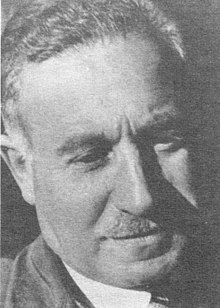Richard Roeder
Richard Roeder (born April 8, 1875 in Posen , † February 25, 1953 in Jerusalem ) was a German social hygienist, city doctor of Berlin-Treptow and Nazi victim.
Life
The merchant's son completed a medical degree at the University of Berlin from 1892 to 1897 after passing his school- leaving examination in Poznan and was awarded a Dr. med. PhD and approved . This was followed by his internship at the Jewish Hospital in Poznan until 1899. From 1900 to 1905 he practiced as a general practitioner in East Berlin. He then worked as a general practitioner and gynecologist in Berlin-Schöneberg until 1923 , interrupted by his participation in the First World War as a military doctor. He was married to Hedwig, nee Asch (1885–1970), who worked as a child psychotherapist and educational advisor in Berlin.
Roeder, who had already joined the SPD when he was a student , was one of the protagonists of the "socialization of the health system" that took place after the revolution of 1918/19. He cultivated friendships with Rosa Luxemburg , Eduard Bernstein , Ignaz Zadek senior and Benno Chajes . In terms of a reformed health system, he campaigned, among other things, for the creation of outpatient clinics for the treatment of sick people, in which doctors could self-manage and collectively work preventive and healing. He was a member of the Association of Socialist Doctors and later in the Working Group of Social Democratic Doctors . From 1923 he was the city doctor of Berlin-Treptow and founded day care centers in this function .
At the beginning of the Nazi era , he was dismissed as a Jew and Social Democrat from the office of city doctor in 1933 and banned from his profession. From 1934 to 1937 he made his living as a pharmaceutical agent . He was briefly detained in 1938 on false accusations, but was released after paying bail. At the beginning of 1939 he emigrated with his wife, first to Belgium and then to France . In August 1940 he was stripped of his German citizenship and his doctorate was revoked. During the Second World War he was interned in Agde and Montpellier from the beginning of November 1940 to the beginning of February 1941 . From February 1941 until the end of the war he was able to go into hiding from the German occupiers with the help of villagers in Saint-Rambert-d'Albon near Lyon . After the end of the war he emigrated to Palestine .
Fonts (selection)
- The socialization of medical healing activity in the Association of Health Insurance, Schoetz, Berlin 1920 (= publications from the field of medical administration. Volume 11, Issue 5).
literature
- Roeder, Richard, Dr. med. In: Alfons Labisch / Florian Tennstedt : The way to the “Law on the Unification of Health Care” of July 3, 1934. Lines and moments of development of the state and municipal health care system in Germany , Part 2, Academy for Public Health Care in Düsseldorf 1985, ISSN 0172 -2131, pp. 479-480.
- Wilfried Witte: Richard Roeder . In: Werner E. Gerabek , Bernhard D. Haage, Gundolf Keil , Wolfgang Wegner (eds.): Enzyklopädie Medizingeschichte , de Gruyter, Berlin et al. 2005, ISBN 3-11-015714-4 , pp. 1257–1258.
- Joseph Walk (ed.): Short biographies on the history of the Jews 1918–1945. Edited by the Leo Baeck Institute, Jerusalem. Saur, Munich 1988, ISBN 3-598-10477-4 , p. 311.
- Rudolph Bauer : Roeder, Richard , in: Hugo Maier (Ed.): Who is who of social work . Freiburg: Lambertus, 1998 ISBN 3-7841-1036-3 , p. 496
Individual evidence
- ↑ a b c d Roeder, Richard, Dr. med. In: Alfons Labisch / Florian Tennstedt: The way to the "Law on the Unification of Health Care" of July 3, 1934. Lines and moments of development of the state and municipal health system in Germany , Part 2, Academy for Public Health in Düsseldorf 1985, p. 479f.
- ↑ a b c Wilfried Witte: Richard Roeder . In: Werner E. Gerabek, Bernhard D. Haage, Gundolf Keil, Wolfgang Wegner (eds.): Enzyklopädie Medizingeschichte , Berlin et al. 2005, pp. 1257–1258
- ^ Heinrich-Wilhelm Wörmann: Resistance in Köpenick and Treptow , Volume 9 of the series of publications on the resistance in Berlin from 1933 to 1945 (2nd edition), Ed .: German Resistance Memorial Center, German Resistance Memorial Center 2010, ISBN 978-3-926082- 43-5 , p. 245
- ^ Denial of academic degrees under National Socialism, Leipzig: 1937 to 1944 at https://www.archiv.uni-leipzig.de
| personal data | |
|---|---|
| SURNAME | Roeder, Richard |
| BRIEF DESCRIPTION | German social hygienist, city doctor of Berlin-Treptow and Nazi victim |
| DATE OF BIRTH | April 8, 1875 |
| PLACE OF BIRTH | Poses |
| DATE OF DEATH | February 25, 1953 |
| Place of death | Jerusalem |
